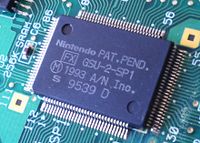| Site Notice |
|---|
|
We have a limited coverage policy. Please check our coverage page to see which articles are allowed. |
Difference between revisions of "Super FX"
Jump to navigation
Jump to search

Torchickens (talk | contribs) |
Torchickens (talk | contribs) |
||
| (One intermediate revision by the same user not shown) | |||
| Line 12: | Line 12: | ||
*[[Star Fox 2]] (originally unreleased until 2017 [[SNES Classic]]) | *[[Star Fox 2]] (originally unreleased until 2017 [[SNES Classic]]) | ||
*[[FX Fighter]] (cancelled but released as non-Nintendo MS-DOS game) | *[[FX Fighter]] (cancelled but released as non-Nintendo MS-DOS game) | ||
| − | + | *[[Winter Gold]] ("Super FX 2") | |
{{stub}} | {{stub}} | ||
{{SNES}} | {{SNES}} | ||
| + | [[Category:Licensed chips]] | ||
Latest revision as of 16:20, 15 December 2021

Super FX Chip on Super Mario World 2: Yoshi's Island
The Super FX Chip refers to the added technology to the Graphics Support Unit (GSU) on Super Nintendo Entertainment System ROMs to support improved 2D and 3D graphics in game.
It was produced by the now defunct company Argonaut Software, and was formally known under the codename "Super Mario FX" (which contrary to some belief, does not refer to a cancelled game), and the backronym "MARIO" ("Mathematical, Argonaut, Rotation, & Input/Output").
Compatible Nintendo published games
- SNES Glider (tech demo)
- Star Fox
- Stunt Race FX
- Super Mario World 2: Yoshi's Island ("Super FX 2")
- Star Fox 2 (originally unreleased until 2017 SNES Classic)
- FX Fighter (cancelled but released as non-Nintendo MS-DOS game)
- Winter Gold ("Super FX 2")
| This article is a stub. You can help NintendoWiki by expanding it. |
|
| ||||||||||||